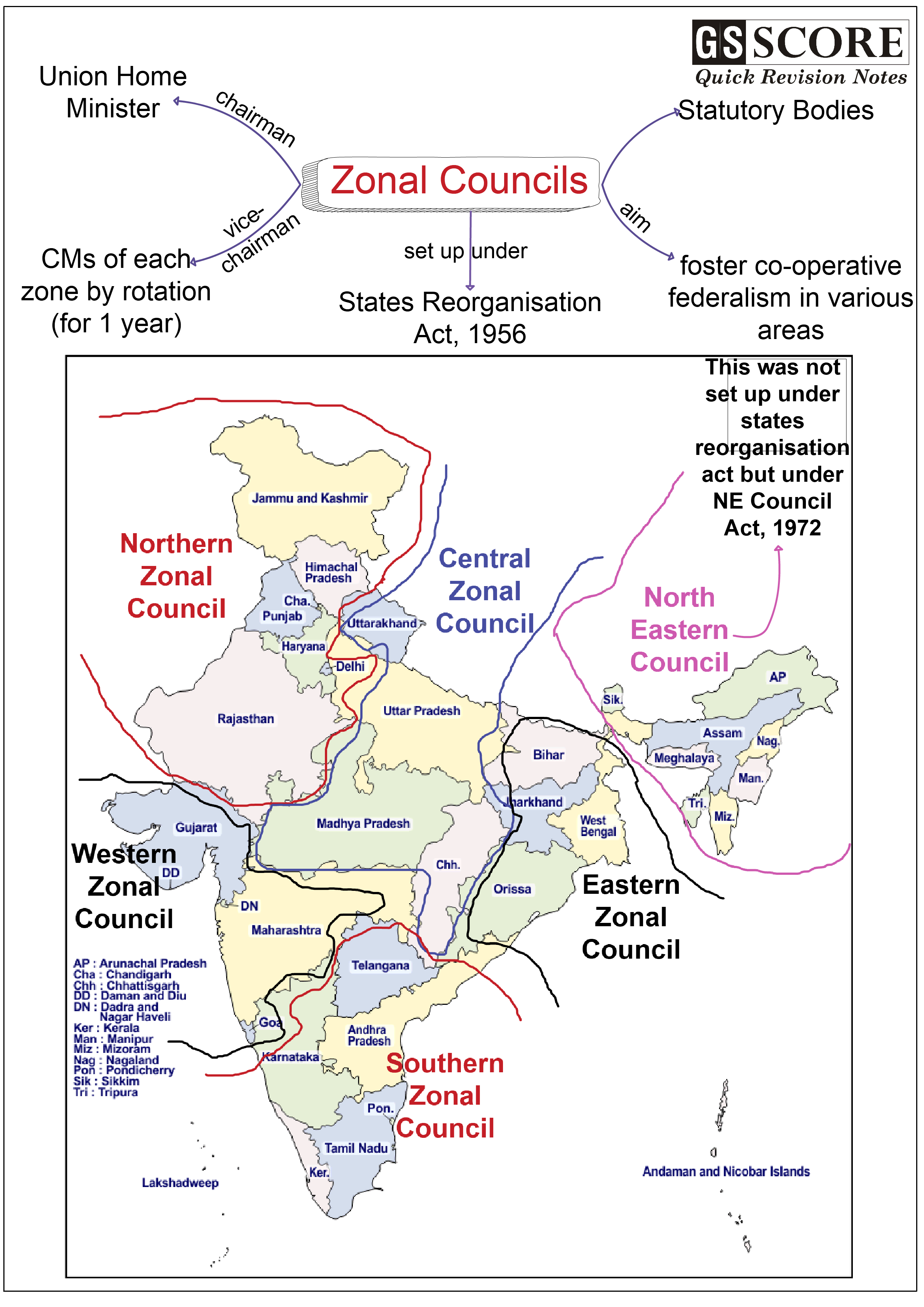

- The 21st Central Zonal Council meeting was recently held in Lucknow, Uttar Pradesh.
- The Council was chaired by Union Home Minister Rajnath Singh and attended by representatives of Central Zonal Council states, i.e, Chhattisgarh, Uttarakhand, Uttar Pradesh and Madhya Pradesh.
Context
- The 21st Central Zonal Council meeting was recently held in Lucknow, Uttar Pradesh.
- The Council was chaired by Union Home Minister Rajnath Singh and attended by representatives of Central Zonal Council states, i.e, Chhattisgarh, Uttarakhand, Uttar Pradesh and Madhya Pradesh.
About
- The idea of zonal councils emerged during course of debate on report of States Re-organisation Commission 1956 (headed by Fazl Ali).
- Thus, Zonal Councils were set up under States Reorganization Act, 1956 to foster inter-state co-operation and co-ordination.
- They are not constitutional bodies unlike Interstate Council, but are statutory bodies.
- Originally five councils were created:
1. Northern Zonal Council: Haryana, Himachal Pradesh, Jammu & Kashmir, Punjab, Rajasthan, National Capital Territory of Delhi (UT) and Chandigarh (UT).
2. Central Zonal Council: Chhattisgarh, Uttarakhand, Uttar Pradesh and Madhya Pradesh
3. Eastern Zonal Council: Bihar, Jharkhand, Orissa and West Bengal;
4. Western Zonal Council: Goa, Gujarat, Maharashtra and UTs of Daman & Diu and Dadra & Nagar Haveli
5. Southern Zonal Council: Andhra Pradesh, Karnataka, Kerala, Tamil Nadu and Puducherry (UT).
- Zonal Councils provide common meeting ground for States to promote and facilitate coordinated efforts for fostering economic and social development.
- They are mandated to discuss and make recommendations on matters of common interest in field of economic and social planning, linguistic minorities, border disputes and inter-State transport etc.
1. Likewise, recent Council discussed various issues including road transport, Pradhanmantri Gramin Sadak Yojna, measures to tackle naxal violence, modernization of Police, infrastructure development of airports, minimum support price, National health mission and issues related to primary schools.
- Composition:
1. Chairman: The Union Home Minister is the Chairman of each of these Councils.
2. Vice Chairman: The Chief Ministers of the States included in each zone act as Vice-Chairman of the Zonal Council for that zone by rotation, each holding office for a period of one year at a time.
3. Members- Chief Minister and two other Ministers as nominated by the Governor from each of the States and two members from Union Territories included in the zone.
4. Advisers- One person nominated by NITI Aayog for each of the Zonal Councils, Chief Secretaries and another officer/Development Commissioner nominated by each of the States included in the Zone.
5. Union Ministers are also invited to participate in the meetings of Zonal Councils depending upon necessity.
- The North Eastern States i.e. (i) Assam (ii) Arunachal Pradesh (iii) Manipur (iv) Tripura (v) Mizoram (vi) Meghalaya (vii) Sikkim and (viii) Nagaland are not included in the Zonal Councils and their special problems are looked after by the North Eastern Council set up under the North Eastern Council Act, 1972.
Significance
- Meeting of Zonal Council provide platform for advancing cooperative federalism and dispute resolution.
- It establishes a climate of co-operation amongst the States forfostering balanced socio economic development of respective zones.
- It becomes essential for successful and speedy execution of development projects undertaken.
- It also counters growth of acute State consciousness, regionalism, linguism and particularistic tendencies.
- It, thus, helps instrengthening national integration.
Learning Aid




